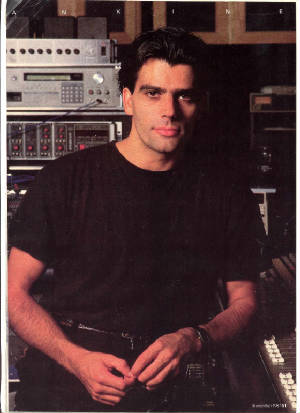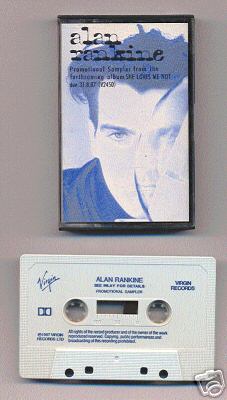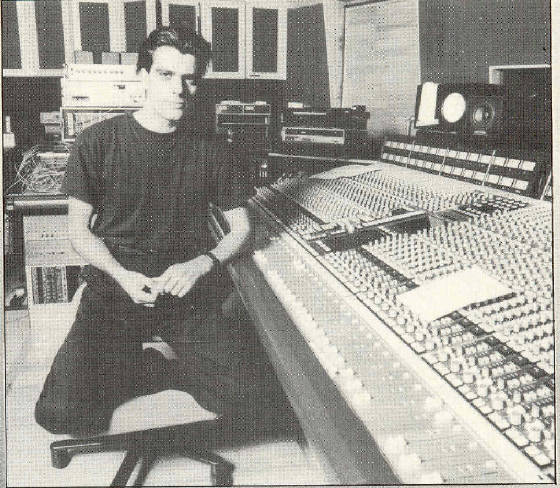
|

|


IM & RW Novenber 1987 (Andrew Smith)
Uptown
Top
Rankine
Andy Smith plays word Association with the talk of the Townhouse , Alan Rankine Scot shots
"Apartnership like the Associates is a once in a lifetime thing and that's all there is to it"
There was always a kinda tension to the music that Alan Rankine and Billy Mackenzie made together as the Associates.
It was a purely creative tension - Alan surprises me when he says that in all the seven years together they never had
a single argument.
Nevertheless there's was a spark to the associates sound that left when Rankine left.
Like a lot of people , I know that I found 1984's album Perhaps , to be a pleasant enough experience ; it had a few good
songs and , of course , Mackenzie's astonishing voice , but the edge was gone.
Alan confesses that a few people have said the same of the material on he's new LP , "She Loves me not", but
particularly in songs like the gloriously danceable single When the world begins to look her age, the spark lives on .
Further there is a pleasing new direction to the songs.
Rankine is willing to let us know what he is thinking .
"After The Associates split I said to myself,"ok let's have a bit of a rest , a little think ". I didn't
have the hunger to do my own songs just then so the most obvious thing was to produce , because then I'd be doing the same
thing as The Associates."
He worked with the Cocteau Twins , a few acts for CBS and Polygram , then he began he's association with the Belgian independant
label Les Disques du Crepuscule , producing Anna Domino , Winston Tong and Paul Haig(including the near hit single , Big Blue
World)
Alan like's to work closely with the artist that he's producing, feeling that it is essential to be heavily involved in
the arrangements of a song.
" If a song is three minute long somewhere around 2.50 there must be a peak, and you can see it happen in every
good song and not happen in every bad one ."
It goes without saying that eventually the hunger to write and record his own songs returned.
Alan knew that it wouldn't feel right to engineer another partnership with a singer in the way that Vince Clark continually
does .
This meant that he would have to sing the songs himself.
He had a hunch that he would be able to do this, but he didn't know because he hadn't tried it before.
"No-one in their right mind , if he's with Mackenzie , even contemplates singing !"
As it turns out , the results were some what unexpected.
" I started with The Sandman and after I did the take I went into the control room to listen to it and I said to
the engineer, a Belgian guy- this sounds like Lou Reed!He said ,'yeah , you're right' ".
This surprises Alan, he says because although he likes Lou Reed's voice and songs , he's never been a great influence
surely a treasonable statement , coming from a Scot.
The LP that The Sandman was to be included on When The World Begins To Look Her Age (the re-recorded title track is also
on the new LP), was recorded in Brussels where Rankine and Crepuscule, the financer, were based.
The aim of this album was to get a major deal , and it was recorded on a budget of 25.000 pounds.
Studio time in Brussels is fairly cheap and the budget was spent primarily in ICP Studios, a 48-track which with Crepscule's
help, he got for about 30 pounds an hour .
As Alan points out , it would have cost about 60.000 pounds to make the record in London.
When The World Begins To Look Her Age did it's job.
Released last September it both signaled Rankine's return as a as a writer and got him a major deal with Virgin.
Having written as half of a partnership for so long did he find it necessary to approach it differently now ?
"Yeah, with The Associates , Bill used to come to my house every Sunday to write songs.
When your working with another person , discipline is created just by the fact that you have to organize and make arrangements
in advance.
There's always someone to bounce idea's off of ."
He takes an example that beautiful meandering piano line from Party Fears Two :
"I remember writing that riff in 1979 .
I played it to Bill and said, "I don't know what to do with it'- to me it sounds like a Persil commercial or something
, you know , just too Poppy.
Bill agreed , but said, 'it's good let's use it.' "
They did of course, and it became their biggest hit on 1982's best-selling Sulk album.
The approach has to be quite different now.
" I can't wake up at 7:30 , go for a run , come back have some honey and tea, then say, 'right , now I'll write a
song'.
I have to wait for inspiration."
This inpiration may come from a guitar riff , a lyrical phrase , a chorus line ("choruses are, after all, just vocal
riffs") or almost anything.
Once the idea has arrived , it takes times to develop it into a song.
" I can't write a song in 40 minutes the way some people say they can .
It takes me five or six days , working 14 hours a day just working till I fall asleep ."
Alan employs a rather curious means of getting these embryonic songs onto tape . Phil Spector would be proud of this .
" I have absolutely no technology at home : no drum machines , no portastudios - nothing.
I have two stereo cassette machines and a tape with drum tracks at various speeds .
I play that and , say, the basic guitar chords onto the other tape machine and play that onto the second machine again
, this time adding something else ,I'll do this maybe six or seven times ,gradually building up the song,and the sound quality
gets worse and worse .
Everyone at my management company knows there's no point in listening to these tapes , 'cos all they'll hear is hiss,
but I know what's there."
The Associates' lyrics were the sole domain of Billy Mackenzie , yet Alan's own songs wield concepts imaginitively and
show a keen turn of a phrase .
The Mackenzie lyric was often an arresting, but quite obscure affair.
When we talked about Party Fears Two , Alan freely admitted that "the lyrics in the song are just a mystery to me.I
don't know what they're about".
And Alan says of another song from Sulk , NO , that he got completely the wrong end of the stick:
" I always thought I knew what it was about - just the scene that was there in Scotland at the time - but a while
ago my best friend said to me :' no your all wrong it's about when Billy used to come to your house to write songs and used
to be embarressed to sit at the tea table and spill peas off his fork'. I realized ,Jesus , he's right!' "
There were exceptions from this: I share Alan's wish that I had written the line from Club Country:
'Every breath you breathe belongs to someone there'
The way that Rankine writes and deals with his subject is far more direct .
The Sandman was directly provoked by a big article on child abuse which appeared in a Brussels newspaper and " hit
me straight in the gut".
Most of the songs pose questions rather then give answers and the underlining theme of the current album She Loves me
not( which was released on September 1) is the battle of the sexes ,
"the way men and women differ in how they appoach things and what they want"- not something that many people
in the music business often ask themselves.
When it's time to record Alan doesn't like to rehearse or demo songs too much before taking them into the studio .
The reason for this is that he likes to let a song take on a life of it's own in the studio , through building and layering
, so each part needs to be able to grow and change with the songs.
If particular parts become too entrenched as the parts arounds them begin to change , then it can be difficult to retain
the original feel of the song .
He works quickly, with whatever tools are there , having no particular favorite instruments.
He doesn't edit the keyboards or fiddle with the sounds too much,
"When I get an idea , I need to find the sound I'm after quickly or the idea starts to fade .
So I just whizz round what's there.
I like to have the (state of the art) equipment but not to the extent that the technology takes over from the humanness
.
You must remember what you're doing.
It's not an exercise in non- existent tape hiss that's just not the point"
As Alan says himself , almost proudly , The Associates records were full of human fraility and this was part of their
attraction.
"People are looking for emotion.
If there's a bit of crackle here or hiss there, no-one's gonna bother too much .
I don't think that's what the vast amounts of money that are spent on making records are for .
You're meant to be going in there to make people feel a certain way through the music your making .
Too many people are just after a fast buck."
Whilst not wanting to name names ("they know who they are, I think ") , Alan goes on to explain that in his
opinion too many people have forgotten this , that there are too many well produced records being made, whose lack of tape
hiss is equalled only by the lack of emotion .
This is what set The Associates apart and what still sets them apart- a kind of fierce humanness .
This is true to the extent that when he and Billy came to prepare for their tour in 1982 as a 9-piece band , made up of
session players , it profoundly upset the equalibrium of the band .
" Bill didn't like someone he hardly knew doing back up vocals on one of his songs"
Alan Rankine on his own still retains that slight perversity The Associates were notorious for , holding the music business
at arms length, yet still getting what he wants from it .
This hasn't been achieved without a struggle , of course, and the more he talks about them, the more you can see that
his attitudes to record companies record making and commercial pressures are both more and less than simple perversity.
"When it comes down to it , the buck stops here. Producers and record companies will work with you , then move on
to something else, but you've got to live with your music for the rest of your life .
You've got to be happy with it when your 60."
Andrew Smith
November1987

|

|

|

